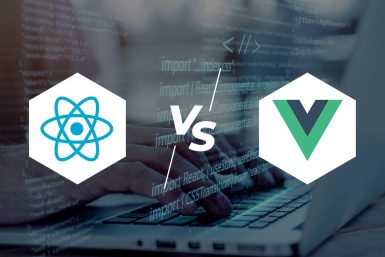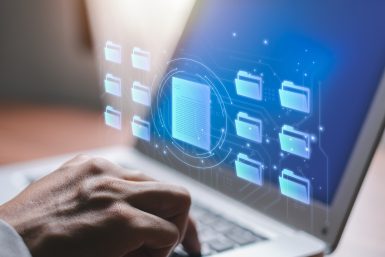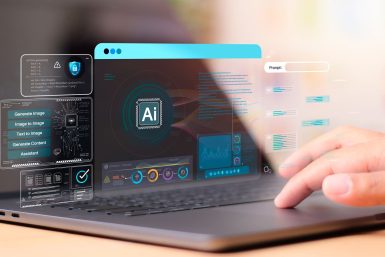15 Key Technologies and Frameworks in 2025 for Software Development.
The 2020s are giving way to 2025 with key innovations in artificial intelligence (AI), cloud, and software. For example, generative AI is advancing by leaps and bounds: McKinsey estimates contributions in the trillions of dollars, and 63% of executives plan to increase its use. At the same time, developers are looking for modern frameworks (React, Vue, Node.js, etc.) that improve efficiency and scalability in their projects. Below, we explore the key technologies and frameworks in 2025, explaining why they are important and how to apply them to software development.
Technologies and Frameworks in 2025
1. Generative and Predictive Artificial Intelligence (AI): Your New Co-Pilot and Oracle.
Generative AI is transforming content creation: tools like ChatGPT or Bard can produce personalized texts, images, or code in seconds. This impacts various sectors:
- Marketing and advertising: Automatically generates tailored campaigns and content.
- Healthcare: Summarizes clinical histories and suggests potential treatments.
- Customer service: AI-powered chatbots offer 24/7 support, improving satisfaction and reducing wait times.
On the other hand, predictive analytics allows anticipating trends and optimizing resources using AI. For example, retailers have reduced supply chain costs by up to 25% by employing predictive analytics based on historical data. In summary, integrating AI (both generative and predictive) into applications will be fundamental for innovating and offering personalized solutions in 2025.
2. Cloud and Edge Computing
Public cloud providers (AWS, Azure, Google Cloud) are increasingly incorporating integrated AI functions. This enables:
- Personalized experiences: AI algorithms analyze user behavior in real-time to adapt services and recommendations.
- Automation: Routine tasks (like tests or deployments) are automated with AI, freeing up the development team for strategic tasks.
Furthermore, edge computing is growing with the rise of IoT. Processing data near where it’s generated (for example, in smart devices or local micro-data centers) reduces latency and bandwidth. This is key in real-time applications (autonomous vehicles, smart factories, online video games). Among the technologies and frameworks in 2025, AI is also seen running locally at the edge, with decentralized models analyzing sensitive data on the device, improving privacy and immediate response.
3. Quantum Computing and Other Technologies
Although still in early stages, quantum computing promises to solve complex problems much faster than conventional computers. It is expected that among the technologies and frameworks in 2025, this will help accelerate the training of large AI models and optimize processes in industries such as logistics, finance, or pharmaceuticals. In addition, emerging technologies like 6G networks (under development) or the insistence on digital sustainability are driving more efficient hardware and architectures. Together, these technologies enable new solutions: for example, transmitting data through quantum systems or exploiting AI on low-power devices.
Development Technologies and Frameworks in 2025
4. Front-end (User Interface): React, Vue.js, and Angular continue to dominate web development thanks to their maturity and active communities.
5. In parallel, lighter frameworks oriented towards performance are emerging: Svelte, Solid.js, and Qwik offer ultra-efficient reactivity and near-instantaneous loading times.
6. Back-end (Server and APIs): Node.js continues as a key platform for allowing JavaScript to be used across the entire stack. Modern Node-based frameworks – such as Deno, NestJS, and Express.js – continue to gain popularity for their security, modularity, and ease for cloud services.
7. Solutions in other languages also stand out: FastAPI (Python) and Spring Boot (Java) lead the construction of APIs and microservices due to their performance and scalability. Their efficiency makes them pillars for modern architectures.
8. Django (Python) and Laravel (PHP) remain relevant for structured web applications.
9. ASP.NET Core (C#) is the standard in enterprise environments, now with Blazor for interactive interfaces in C#. In general, frameworks that facilitate microservices architectures, REST APIs, or GraphQL will be the most relevant in 2025.
10. Programming Languages: Python continues to lead due to its versatility. It is essential for data science, AI, web development, and automation. Following it are JavaScript (and TypeScript), Java, C#, and C++ as pillars of development.
11. New languages are on the rise in the technologies and frameworks in 2025: for example, Rust has climbed positions in the TIOBE ranking (#13 in February 2025), thanks to its high performance and security, and is used in areas such as WebAssembly, embedded systems, and cryptocurrencies. Go also continues to grow due to its efficiency in cloud services. By 2025, it’s advisable to know these key languages, as they form the basis of many modern frameworks.
12. Low-Code / No-Code Platforms: Development with no code or low code will gain strength in the technologies and frameworks in 2025. These platforms allow teams (even without extensive technical knowledge) to create functional applications quickly using visual interfaces. In corporate environments, they drive internal innovation by accelerating prototypes and internal tools.
13. Development and Collaboration Tools: The DevOps ecosystem continues to evolve. Real-time collaboration tools (GitHub, GitLab) and CI/CD systems (Jenkins, GitHub Actions, etc.) are already essential and are being enriched with integrations (for example, ChatOps and smarter pipelines).
14. In addition, AI in development is a trend in the technologies and frameworks in 2025. Assistants like GitHub Copilot or environments with code analysis allow for automatic code generation and correction.
15. Smart IDEs (VS Code, IntelliJ, PyCharm) also integrate AI functions and static analysis to increase productivity. In summary, with the technologies and frameworks in 2025, development teams will have tools that automate routine tasks and improve software quality.
Conclusion
With these technologies and frameworks in 2025, software development will be marked by the fusion of new technologies and efficient frameworks. Artificial intelligence (generative and predictive) and advanced computing (cloud, edge, quantum) will redefine how we create applications, driving more personalized and intelligent solutions.
At the same time, mastering consolidated frameworks (React, Angular, Django, Spring Boot, etc.) and emerging ones (Svelte, FastAPI, NestJS, Blazor, among others) will be key to building scalable and secure applications. Staying updated with these 15 technologies and frameworks in 2025 will allow you and your team to offer innovative, high-value solutions. Furthermore, to optimize your workflow, consider how tools like Cursor, powered by AI, are revolutionizing how code is written and debugged, or delve into the differences between frontend giants by reading our analysis on React vs. Vue.
Sources
//Technologies we excel in
// WHO TRUSTS US






Join Us on Our Journey
At Ingenius, we are committed to providing our customers with the best possible software solutions, tailored to their unique needs and challenges.
With our team of experienced professionals, passion for technology, and unwavering commitment to excellence, we're confident we can help you achieve your goals.
Contact us today
Let's talk about how we can help you transform your business through innovative software solutions.




